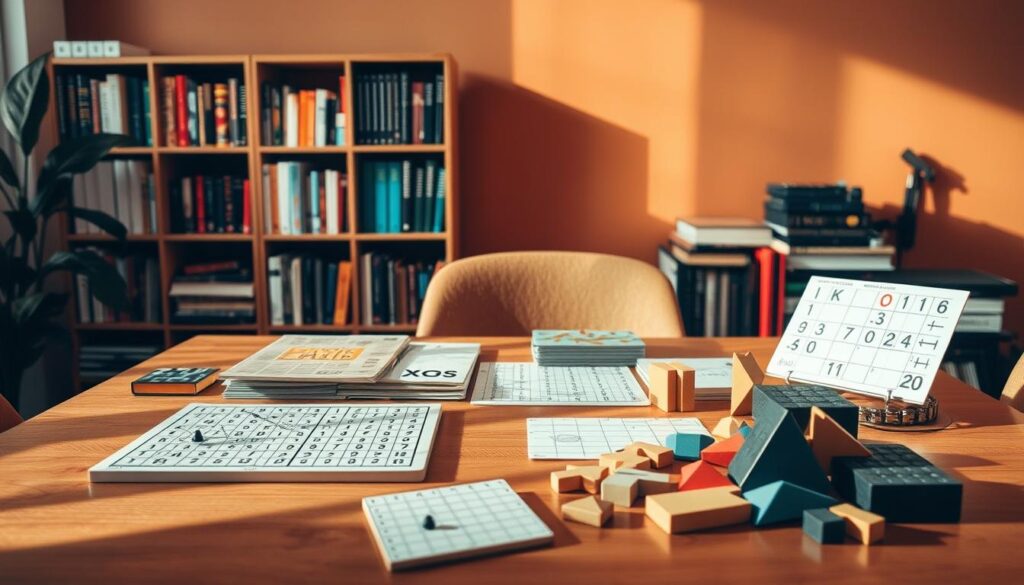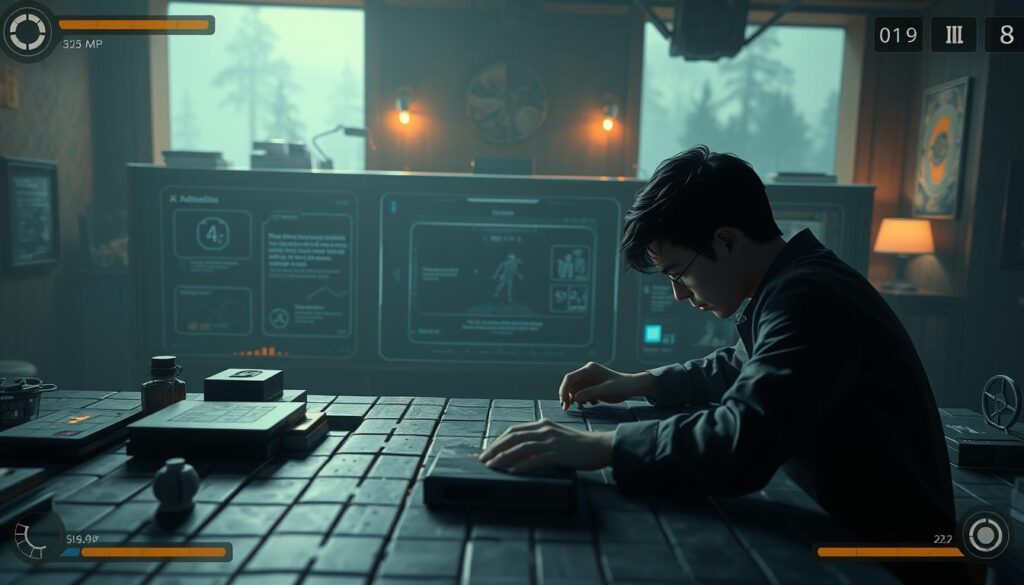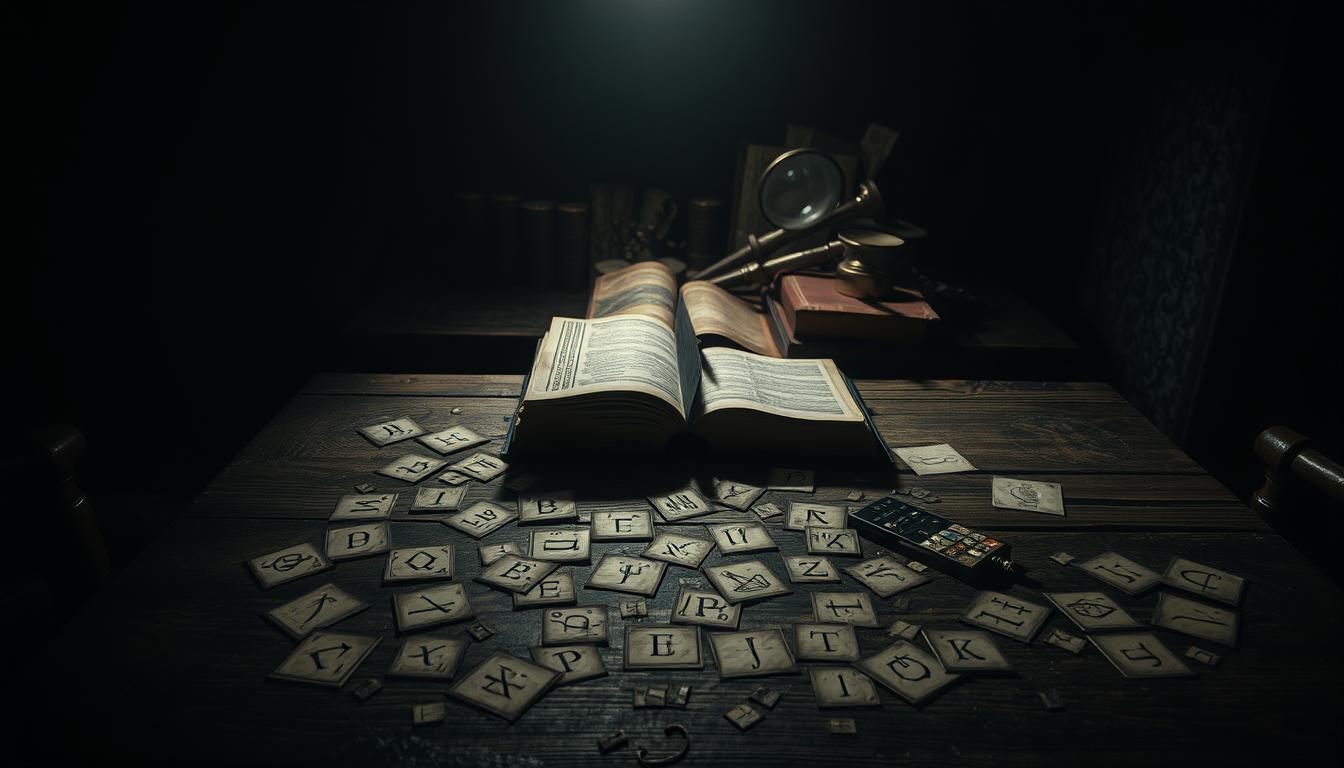Puzzle games with hidden clues that require deep deduction
Ever wondered why some games are not just fun, but also make your mind sharper? Puzzle games with hidden clues are a great example. They challenge players to uncover clues through deep thinking and teamwork.
These games are becoming more popular for family fun and friendly competitions. They offer a unique way to improve your brain skills.
Solving mysteries or finding hidden clues can boost your cognitive abilities. It’s a rewarding experience that sharpens your critical thinking. Let’s explore this exciting world together.
Introduction to Logic Deduction Games
Logic deduction games are a special part of the board game world. They focus on solving puzzles and making smart choices, rather than just playing with friends. Players must use their brains to figure out clues and plan their moves.
Games like Cryptid and Outfoxed show why these games are so popular. They draw in people of all ages. The games encourage teamwork and strategy, making every decision important.
These games are not just fun. They also help improve your thinking and problem-solving skills. The mix of enjoyment and mental challenge keeps players coming back for more.

What Makes a Game Engaging for Deep Deduction?
Engaging gameplay is key for games that want to pull players into a world of deep thinking. Themes and stories that grab your attention make the game exciting. Puzzle mechanics that are cleverly designed challenge players to solve mysteries.
Player interaction is also crucial. Games that let players work together make the experience more fun. Players can share ideas and work as a team to solve the story. Games like “The Shipwreck Arcana” and “Awkward Guests” are great examples. They have interesting stories and unique gameplay that keeps players coming back.
Games that mix engaging gameplay, clever puzzles, and teamwork offer a fun and challenging experience. They make players think and enjoy the game at the same time.

Benefits of Playing Puzzle Games
Puzzle games offer many benefits that improve both individual skills and teamwork. They provide fun and challenging content. Players can unlock their potential while enjoying the game. These games are great for critical thinking and teamwork.
Sharpening Critical Thinking Skills
Puzzle games boost cognitive functions like problem-solving and decision-making. Players must analyze clues and make smart guesses. This sharpens their critical thinking skills.
It also helps them think logically and reason better. This improvement can benefit other areas of life.
Enhancing Teamwork and Collaboration
Many puzzle games focus on teamwork, pushing players to work together. Games like “MicroMacro: Crime City” require players to share ideas and solve problems together. This teamwork strengthens relationships and social skills.
Types of Puzzle Games
Puzzle games come in two main types: cooperative and competitive. Knowing these helps players find games that fit their style. This makes the gaming experience better.
Cooperative Puzzle Games
Cooperative puzzle games are all about teamwork. Games like “The Shipwreck Arcana” and “Outfoxed” ask players to share ideas. This builds teamwork and collaboration.
These games are perfect for those who love working together. They focus on solving problems as a team.
Competitive Puzzle Games
Competitive puzzle games are all about beating others. Games like “Cryptid” and “Awkward Guests” test your skills against others. It’s all about showing off your problem-solving skills.
These games are great for those who love competition. They enjoy proving they’re the best at solving puzzles.
Top Puzzle Games with Hidden Clues
Exploring top deduction games shows us many fun games with hidden clues and smart strategies. We look at games that challenge players’ thinking and are fun for families or offer deep challenges for adults.
Outfoxed: A Family-Friendly Detective Game
Outfoxed is a great game for families. It’s all about working together to solve a mystery. Players help find the thief who stole a pot pie. It’s colorful and easy to play, even for kids as young as five.
Cryptid is for those who love a good challenge. Players are cryptozoologists searching for a mysterious creature. They use clues and strategy to outsmart their opponents. It’s perfect for those who enjoy a strategic game.
The Shipwreck Arcana: A Cooperative Mystery Adventure
The Shipwreck Arcana is a team effort to solve a mystery. Each player has special skills to find clues. Working together, they try to survive and solve the mystery.
Awkward Guests: The Ultimate Murder Mystery
Awkward Guests is a twist on classic murder mysteries. It has different cases each time you play. Players must find clues and solve the crime before time runs out. It’s fun and keeps you thinking.
| Game Title | Type | Age Suitability | Playtime |
|---|---|---|---|
| Outfoxed | Cooperative | 5+ | 30 minutes |
| Cryptid | Strategic | 10+ | 30-60 minutes |
| The Shipwreck Arcana | Cooperative | 14+ | 30-60 minutes |
| Awkward Guests | Competitive | 14+ | 45-90 minutes |
Brain Games for Adult Deductive Reasoning
Playing brain games for adults can really boost your deductive reasoning skills. These games make you think deeply and solve logic puzzles in fun ways. Games like “Turing Machine,” “Sleuth,” and “The Search for Planet X” show how much fun and learning you can get from them.
Turing Machine: Code-Breaking Challenge
“Turing Machine” takes you into a world of code-cracking. You’ll solve logic puzzles to find hidden codes. It’s a game that needs deep thinking and sharp deductive skills, perfect for adults looking to challenge their minds.
Sleuth: Pure Logic Reasoning Experience
“Sleuth” is all about sharpening your logical thinking. You’ll ask questions and make deductions to solve mysteries. It’s a game that encourages you to think critically and interact with others, making your reasoning skills even better.
The Search for Planet X: Astronomical Deduction
“The Search for Planet X” adds a modern twist to classic deduction games. You’ll use clues and solve patterns in space, all while improving your deductive reasoning. The game’s use of technology makes it exciting and keeps you hooked on solving cosmic mysteries.
How to Choose the Right Puzzle Game
Choosing the right puzzle game is about more than just picking a title. It’s about finding a game that fits everyone’s skill level and interests. This ensures that everyone has a great time.
Consider Age and Skill Levels
Think about the age and skill levels of the players. Younger players might enjoy simpler games, while older or more experienced players might prefer harder puzzles. This way, everyone can have fun and interact well with each other.
Theme Preferences and Complexity
The theme of a puzzle game can really make a difference. Games that match a player’s interests, like mystery or fantasy, are usually more appealing. It’s also important to find a game that’s not too easy or too hard. This balance is key to keeping players engaged, regardless of their skill level.
Game Mechanics to Look For
Understanding game mechanics is key when playing deduction games. These mechanics make the game more fun and engaging. Aspects like clue gathering and visuals are crucial for a great experience.
Clue Gathering and Information Sharing
Clue gathering is at the heart of deduction games. Players need to find, understand, and share clues. This leads to teamwork and strategy, helping solve the mystery together.
Effective Use of Visuals in Gameplay
Visuals are essential in keeping players interested. Well-designed boards and cards pull players into the story. They make the game more immersive and fun.
Engaging Features in Modern Games
Modern games have changed a lot, thanks to new technology. They now mix old-school fun with new tricks. This makes games more exciting and fun for players.
App Integration for Enhanced Gameplay
App integration has made games even better. Players can use apps to track clues, solve puzzles, or play with others. These apps add cool features like live updates and maps, making games more fun.
Replayability Through Randomized Elements
Modern games are all about replaying them over and over. Random elements make each play different. This keeps players coming back for more, as they face new puzzles every time.
Exploring the World of Tabletop Deduction Games
Tabletop games have changed a lot, especially in deduction games. These games mix strategy with stories, making a unique experience. They encourage teamwork and problem-solving.
Players find hidden clues and solve puzzles in these games. Titles like *Sherlock Holmes: Consulting Detective* and *Mysterium* are favorites. They make players work together to solve mysteries.
These games are great for socializing and teamwork. They’re perfect for those who love working together. As they become more popular, new designs and mechanics are being tried out.
Tabletop deduction games offer exciting challenges and a strong sense of community. Players enjoy solving puzzles and making friends through gaming.
Social vs. Logic Deduction Games
In the world of gaming, there are different styles for everyone. Social deduction games are all about how people interact, lie, and negotiate. They mix strategy with understanding people’s minds. Games like *Werewolf* and *The Resistance* are great examples. Players try to figure out who’s who and who to trust.
Logic deduction games, however, are all about solving puzzles and thinking clearly. Players work alone to find the truth. Games like *Mastermind* and *Clue* are perfect for this. They challenge players to use what little information they have to solve mysteries.
| Aspect | Social Deduction Games | Logic Deduction Games |
|---|---|---|
| Player Interaction | High emphasis on collaboration and deception | Focus on individual reasoning and problem-solving |
| Gameplay Goals | Identify hidden roles and alliances | Uncover solutions or patterns through logic |
| Examples | Werewolf, The Resistance, Secret Hitler | Mastermind, Clue, The Search for Planet X |
| Player Styles | Socializers, persuaders, negotiators | Analytical thinkers, strategists, problem-solvers |
Both types of games offer unique fun. Whether you love the clever tricks of social deduction or the clear thinking in logic deduction, it shows what you enjoy. It’s all about how you like to play and interact.
Community and Social Interaction in Puzzle Games
Puzzle games are great places for people to come together. They share their love for solving puzzles. These games help people make friends from different backgrounds.
Players work together in many puzzle games. This teamwork improves communication and builds friendships. The friendships made in games can also grow in real life.
Gaming events and conventions are key for these communities. They let players meet, share tips, and compete. Online forums and social media also help keep the connections alive.
These communities mix fun and teamwork. They make gaming more enjoyable and rewarding. Puzzle games help create strong, supportive groups.
Exploring Online Variants of Puzzle Games
Technology has changed the game for puzzle lovers with online puzzle games. These digital versions of classic games let players solve puzzles from anywhere. Many platforms offer a wide range of puzzles, making it easy for everyone to play.
Today’s online puzzle games are easy to use and fun to play. You can play with friends or meet new people, creating a special community. Playing with others from around the world adds to the fun and challenge.
Switching to digital puzzles has made old favorites even better. These new versions keep the core of the game but add cool features like timed challenges and leaderboards. This change is great for both new and experienced players, offering new ways to play and solve puzzles.
| Features of Online Puzzle Games | Benefits |
|---|---|
| Interactive Gameplay | Enhances engagement and replayability |
| Global Access | Connects players from different regions |
| User-Friendly Interfaces | Facilitates easy navigation and participation |
| Leaderboards and Rankings | Encourages healthy competition among players |
As puzzle games keep changing, online versions are key to reaching more people. They offer exciting new ways to enjoy puzzles, appealing to both old and new fans.
Conclusion
Puzzle games with hidden clues and deep deduction are truly engaging. They challenge players and improve critical thinking. Families and individuals find fun and a chance to get better at solving problems together.
The world of puzzle games is always changing. New ideas and themes keep coming, appealing to many. This makes puzzle games exciting for everyone, no matter their skill level.
Looking ahead, we’ll see even more puzzle games that bring people together. Different styles and formats will attract more players. This growth shows why puzzle games are so loved, now and in the future.
FAQ
What are logic deduction games?
Logic deduction games are puzzles that challenge your thinking. They require you to find clues and solve problems. Players often work together to find the answers.
What are the benefits of playing puzzle games?
Puzzle games boost your critical thinking and teamwork skills. They keep your brain sharp and make learning fun. Plus, they create lasting memories when played with others.
How do I choose the right puzzle game for my family?
Think about the age and skill levels of your family members. Choose games that fit everyone’s interests and abilities. This way, everyone can have fun together.
What distinguishes cooperative puzzle games from competitive ones?
Cooperative games are about teamwork, where everyone works together. Competitive games are about winning, where players compete against each other.
Are there specific puzzle games recommended for adults?
Yes, adults might like “Turing Machine” for code-breaking, “Sleuth” for questioning, and “The Search for Planet X” for a detective challenge with app help.
How do game mechanics enhance the player experience in deduction games?
Mechanics like clue gathering and visuals make games more engaging. They keep players focused and excited to solve the puzzles.
What modern features are found in today’s puzzle games?
Today’s games often use apps for better play and have random elements. This makes each play different and keeps the game fresh.
How do online platforms impact the experience of playing puzzle games?
Online platforms let you play classic games from anywhere. They offer easy-to-use interfaces and interactive play. This makes puzzle games more accessible and fun for everyone.
What aspects contribute to the community surrounding puzzle games?
Puzzle games bring people together through teamwork and sharing. Online forums and social media help build a strong gaming community around these games.














